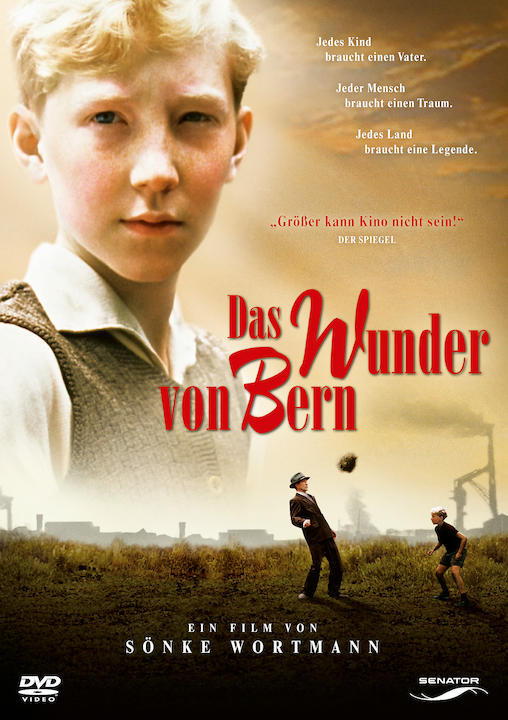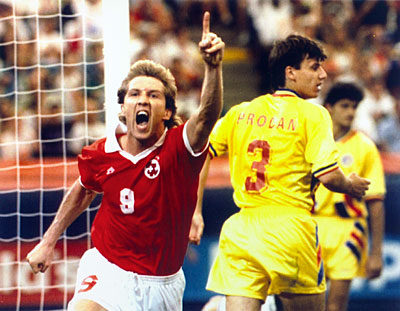Memories of Swiss-hosted 1954 World Cup

This year's European championships will be the second time Switzerland has hosted a major football tournament, following the 1954 World Cup.
Marcel Flückiger, who represented his country on home turf 54 years ago, looks back with swissinfo over the highs and lows of an event-packed World Cup that helped establish Switzerland on the world footballing map.
Then a 24-year-old defender, Flückiger recalls a more restrained atmosphere in the post-war years and a completely different way of life for the players.
Switzerland was awarded the tournament partly because football’s governing body, Fifa, was celebrating its 50th anniversary and was based in the country. The hosts beat Italy twice en route to the quarterfinals where they lost an amazing game against Austria 5-7 despite leading 3-0.
Euro 2008 has been marked by a carnival-like build-up from co-hosts Switzerland and Austria.
“There was not the same euphoria as today as people were quieter. We were not such big stars as players are today and we led a more humble life without having to sign so many autographs,” the 78-year-old Flückiger told swissinfo.
“We were not professional footballers, we had other work during the week. We earned a hundred times less than today’s generation.”
Great team
However, the tournament started well for Switzerland as they beat the mighty Italy 2-1 in the opening game.
“Italy, even then, were a very big side, but we had a very good team with the likes of Roger Vonlanthen, Robert Ballaman, Josef Hügi and Eugene Parlier in goal. This was one of the best teams Switzerland has ever produced,” Flückiger recalled.
But things did not go quite so well for Flückiger on his national debut as he broke a rib in a collision with Italian star Giampiero Boniperti. The injury was to end Flückiger’s tournament and he never played international football again.
Switzerland thrashed Italy 4-1 to meet Austria in the quarterfinals in Lausanne. But after scoring three unanswered goals, the Swiss somehow managed to leak seven against a rampant Austrian attack while adding another two themselves.
“It was an abnormally hot day and our goalkeeper and two defenders got sun-stroke. They felt ill and the goalkeeper could not see the ball,” explained Flückiger.
“When we were three goals up, everyone thought we were through. We were very disappointed to be out. I would have been fit to play in the next game.”
No comparison
Flückiger still follows the fortunes of the Swiss national side, but does not think the current crop are as good as the school of ’54.
“It is a very different team from the one I played in, partly good and partly bad. They don’t seem to have found the right combination and many play abroad so the team does not perform well enough as a collective unit,” he said.
“The best player is Tranquillo Barnetta because he is quick, strong, shows good awareness and scores good goals.”
Switzerland defied the odds to reach the final 16 in the 2006 World Cup in Germany. But can the current team lift the Euro 2008 trophy? No, says Flückiger.
“I don’t think they will win the tournament, that’s aiming a bit too high. But I hope they can reach the quarterfinals. That would be a success for me.”
swissinfo, Matthew Allen
Co-hosts Switzerland and Austria qualified automatically for the tournament, which takes place from June 7-29.
The 31 games will be played in four cities in Switzerland (Basel, Bern, Geneva and Zurich) and four cities in Austria (Innsbruck, Klagenfurt, Salzburg and Vienna). The final will be held in Vienna on June 29. Switzerland will play its three group matches in Basel.
The finals will be broadcast in 170 countries with an expected combined total of eight billion TV viewing figures for all matches.
Up to 5.4 million football fans are expected to follow the tournament in Switzerland, including 1.4 million from abroad.
Switzerland hosted the second post-war World Cup in 1954, with 16 teams taking part.
Switzerland finished second in their group, behind England, to qualify for the quarterfinal match against Austria – a game that produced a record 12 goals.
The eventual winners of the tournament were West Germany, winning their first World Cup against the favourites, Hungary. The game was labelled “The Miracle of Bern” by the Germans, who won in the Swiss capital on July 4.
The match was made into a feature movie by German filmmakers in 2003.

In compliance with the JTI standards
More: SWI swissinfo.ch certified by the Journalism Trust Initiative



You can find an overview of ongoing debates with our journalists here . Please join us!
If you want to start a conversation about a topic raised in this article or want to report factual errors, email us at english@swissinfo.ch.